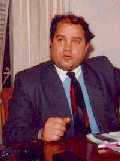|
This article is written in response to Sam Vaknin's The Army of Liberation, part of the Union of Death debate series |
It is strange, but unfortunately true, that a segment of the international press is presently perpetuating a myth that all Kosovar Albanians - to say nothing of the Albanians of Macedonia and Montenegro - are gangsters, drug dealers and plot makers. As my own experiences have illustrated, though, this is not the first time that Albanians have faced this reality: during the Albanian crises of 1997 to 1998, many European media outlets seemed to need, in obvious defiance of the facts, to portray the Albanians of Albania as renegade paramilitary fighters and gangsters bent on destroying the Albanian state.
Today, the details are a little different, but the stereotypes are the same and have merely been geographically relocated to the Albanians of Kosovo.
Surely, every person has the right to form and hold his or her own opinion, even if it is patently incorrect. However, individuals who represent an institution in service of the public have a special responsibility to be factual and objective. Journalists, in particular, have a strict obligation to respect the ethics and rules of their noble profession, particularly as it shapes the opinions of the wider world.
Journalism is rightfully called the Fourth Estate or the fourth power of an organized State and, in accordance with its ethical code, should be perceived by its practitioners, the wider public and the functionaries of State alike as operating as a power within the state but completely independent of the State.
Making public opinion
It is true that independence in journalism is difficult to preserve at all times, but this does not mean that we, the journalists, should be released from our principal ethical obligations. We should, in fact, struggle and fight to preserve our objectivity, particularly in view of our role in shaping not only the opinions of our readers, but also the reality of domestic and international events.
Journalists must never forget their primary role in making and institutionalizing public opinion, which is truly the means through which social and political equilibrium -between legislative power and the voters, the legislature and the executive, judicial power and individual rights, and journalism and the readers- is ensured.
In our profession's work, we can never forget the importance of impartiality, the reality of facts or their verification by at least two independent sources - nor can we permit journalism to become subservient to the interests of politics and politicians.
Sadly, as illustrated by a review of international press coverage of Albanians in Albania and Kosovo, too many journalists have forsaken the principles of our profession, betraying it to political interests and, in the process, breaking faith not only with their readers, but with their subjects: the Albanian people.
Confusing nationalism with professionalismIn 1997, the bankruptcy of pyramid schemes in which a majority of Albanian families had invested their life savings brought about one of the most difficult crises in Albanian history. As an Albanian journalist observing the crisis and its pivotal events, I was shocked by the manner in which international media outlets attempted to exaggerate the depth of the crisis and, in so doing, helped deepen the crisis itself.
As with most other nations, Albania has some internal differences occasioned by geography, in which the traditions and views of groups in distinct regions gives rise to cultural and economic differences across the land. In Albania, there is a distinct, though hardly divisive, difference between the cultural traditions, political preferences and economic fortunes of the northern Albanians, who speak an identifiable Gheg dialect, and their southern co-nationals, who by majority speak the Tosk variant.
These minor cultural and linguistic differences were seized upon and blown out of proportion by international media, who used them in support of their stories proclaiming imminent civil war in Albania.
The first days of March 1997 were dark for both the people and local media. Following the collapse of the pyramid schemes, domestic media reported widely on the people's outrage over the government's handling of the case. Recognizing the danger of an independent press that openly reported the people's dissatisfaction, the government, then headed by President Sali Berisha, arranged for Parliament to pass a law that effectively shut down the press.
Beyond Berisha's reach
While Parliament's act surely silenced domestic media, the international press was beyond Berisha's reach, and so foreign journalists arrived to cover the growing crisis. Their dispatches and live broadcasts influenced not only international opinion, but also the domestic Albanian political scene, as in the absence of their own press Albanians turned to international coverage for news of their own country.
Particularly influential were Greek and Italian broadcast media, who drew the greatest audience among Albanians.
In those days of an absolute domestic press blackout, the Albanian people received a strange message from the foreign press, the leitmotif of whose coverage was that "the South" was preparing an assault against the people of "the North," whom the faceless "South" allegedly saw as being in league with the "northern-dominated" government of Berisha. The primary battleground, foreign journalists trumpeted, would be Tirana.
The central piece of evidence holding this argument together? By a simple act of fate, then-president Sali Berisha had been born in the northern city of Tropoja. This, coupled with the real existence of cultural and political differences between north and south, was somehow interpreted by Greek and Italian media outlets alike as meaning that civil war was imminent, ignoring completely the fact that northerners and southerners alike had lost their life savings in the pyramid schemes and, together, were angrily calling for the resignation of the Berisha government.
Waiting for "liberation"
A war psychology set in among the Albanian people, nourished by daily injections from the foreign media, in which some Albanians actually came to believe that "the South" was coming to Tirana to "liberate" the city from Berisha's occupation. More than a few craned their ears at night, listening for the approaching "Northern Armies" international reporters were saying were on their way to protect their beloved President.
In the absence of unbiased international news or a competing domestic perspective, many Albanians came to believe the message they were being spoon-fed, although the passing of time clearly revealed to us and foreign observers alike that no civil war was brewing in Albania. Gradually, the crisis passed and was resolved through peaceful, democratic elections.
Certainly, there were incidences of violence at the height of the crisis, and a handful of the political problems that then plagued the country linger unsolved today. But nothing was so terrible as the foreign press reported, day-by-day, in the Albania of 1997.
Throughout all of this, Greek journalists were particularly influenced by their nation's traditional designs on regions of Southern Albanian. Throughout the crisis, the spectre of "civil war" was represented in Greek media as being representative of a long-standing desire of all southern Albanians to declare independence from Albanian proper.
Daily, Greek media reported live from different cities and villages in the southern half of the country, broadcasting images of purported regional and municipal proclamations of independence. At one point, Greece's deputy foreign minister visited what his country's media called "liberated zones" on the pretext of evaluating the human rights situation of the Greek minority.
It finally took a declaration from Turkish Foreign Minister Tansy Chiler to change the triumphalist, separatist tone of Greek media. Reacting to Greek reports that parts of southern Albania may want to separate and that Greece could, potentially, intervene to protect the Greek minority, Chiler declared "Turkey will never permit the violation of Albanian territory and integrity and, in the case of such events, will intervene immediately."
The utopic Greek dream of annexing southern Albania was finished on the spot, yet in the aftermath of the crisis neither the Greek press nor the Greek government asked any pardon from the Albanian people, nor reflected critically on the hysteria and wild speculation they fomented. Clearly, the Greek media confused nationalism with professionalism.
If it bleeds, it leads...On 14 September 1998, Azem Hajdari was gunned down behind the Democratic Party's (DP) office. At the time of his murder, Hajdari was a sitting Democratic Party deputy, having founded the DP as Albania's
 |
| Gunned down |
Eventually, confrontations broke out between militants from the Democratic Party and the Republic Guard. In the ensuing violence, the army refused to allow the police to intervene, a number of people were injured and storefronts destroyed. Surely, it was another crisis for Albania to face, and the international right to be informed brought hundreds of foreign correspondents to Tirana once again.
The spectre of civil war between "the North" and "the South" was again raised but, this time around, there was no law restricting the freedom of the domestic press. As a practising journalist, I was called upon to report a step-by-step evaluation of the situation for the Italian outlet Radio Radicale and, at the time I was filing for Radicale, violence in the streets was at its height.
Later, I was asked to report for the Italian national television channel Italia Uno, whose reporter had not, at that point, reached Tirana.
An end to violence
"Unfortunately," Italia Uno was not impressed with my reporting, as I did not report more violence, more crushing of demonstrators by the army, more spectres of war between the faceless forces of the "North" and "South." The program, Studio Aperto, was live, and the program's director issued a surprised question-slash-declaration: "there is not any more shooting!?"
Factually, my reports were accurate as I related what was happening before me, nothing more. By that point in the crisis, the police had regained control of Tirana and the government was controlling the state administration. In search of a scoop on the outbreak of civil war in Albania, Italia Uno was surprised by my report, particularly given that the events I was reporting differed markedly from my earlier dispatches for Radio Radicale.
The next day, Italia Uno called again because their reporter had still not arrived in Tirana. Having just left a press conference held by Democratic Party president Sali Berisha, I reported that Berisha had vowed that "we will never accept the violent usurpation of political power" and had called for an end to the violence to accompany a political solution to the crisis. Providing modest analysis of Berisha's declarations in the language of my profession, I reported that the situation appeared to be improving, and noted the possibility of a political solution.
Not more than five minutes after filing my report, Italia Uno reporter Sabina Fedeli arrived on the scene and began a live broadcast from Tirana in which she described in vivid detail the spectre of civil war dividing Albania in which, in the inverse of the situation the year before, she declared that "the South" was moving on Tirana to protect the new government from "invaders" from "the North," by which she meant Berisha's followers.
Ready to die for a cause
In reporting that the demonstrations in Tirana were petering out following Berisha's call for calm, I had quoted the leader of the protesters in Tirana, who said he was ordering a halt to protests and inflammatory actions. By contrast, Italia Uno's Fedeli based her report on an interview with a 16-year-old boy who declared that he and his friends were ready to die for Berisha.
Unlike during the previous year's crisis, Albanian citizens listened to their own media above the reports of Italian and Greek outlets, and so were appraised of what time proved to be the correct interpretation of events: the protests and violence, while divisive, did not shatter Albania and were resolved through peaceful, political means.
Surely, professional, personal and national interests played a part in the reports of both Albanian and foreign journalists. The internationals, for their part, had a propensity to emphasize the difficulty of the situation and the danger to which they were exposed in Albania, which not only produced more commercially viable copy and footage, but also justified their expenses and their having gone to Albania in the first instance.
By comparison, Albanian reporters were reporting on their own country, in stories that would affect the fate of their own families. Certainly, some attempted to put the most positive spin possible on the story at hand for the sake of their homes and their nation.
However, the fact remains: in their reportage, Albanian media outlets in 1998 were far more professional than their international counterparts in working to expose the truth of the situation rather than in trying to "create" a story.
Fraudulent scoops and sources that would make "Deep Throat" blushThe current situation in Kosovo is hardly ideal and I, as an Albanian journalist, have no particular expertise on the situation there. That said, though, I have not been alone in being appalled at the manner in which some leading English language newspapers, in bids to boost their circulation through "scoops," have allowed themselves to unflinchingly rely on single, unconfirmed sources possessed of political objectives while at the same time making fraudulent claims about the nature of these very same "scoops."
In some instances, these were the same papers who, just a few years ago, were the first to expose Serbian human rights violations in Kosovo. In this, I am thinking particularly about the Observer, the Guardian and the Sunday Times in the United Kingdom and the Washington Post in the United States. Throughout recent months, these papers have carried through with leitmotif of Kosovar Albanians as narco-terrorists, ethnic bigots and gangsters.
While I do not defend all Kosovar Albanians as sterling individuals, the fact remains that they have put precious little shoe-leather into verifying the veracity of their sources or in providing context or nuance for their dispatches.
One of the primary bases of this revisionist phenomenon was a "confidential" report by the United Nations mission in Kosovo, discussing alleged misdeeds of the Kosovo Protection Corps. The report, written using anonymous sources unknown to the journalists who eventually made it public absent any context, was prepared for UN Secretary General Kofi Annan, and discussed allegations of killings, torture, extortion and other misdeeds allegedly committed by the Protection Corps in January 1999.
In making it public, the very fact of the report's existence and confidentiality made it a banner story for the these world-leading newspapers.
Abiding by the ethics of journalism
Ascertaining whether the report was factual is beyond my journalistic "beat" here in Albania, and the ethics of my profession forbid me from refuting the "facts" without possessing "counter-facts." A couple of points do stick out in my mind, though, as speaking to both the poverty of ethics among some in the professional media, and the lingering power of the stereotype of Albanians as a people given to violence and a propensity for civil war.
In the first instance, the report was leaked to the media by elements possessed of distinct political agendas as regard Kosovo, yet this was not mentioned in any of the coverage we saw. Furthermore, that the report was presented without any follow-up investigation or context by the reporters involved speaks poorly of the ethics of the international media.
In this respect, no one mentioned that the report had been prepared in January 2000, immediately following the establishment of the Protection Corps, while it was made public in mid-March. None of the journalists showed any evidence of having carried out their own independent investigations to determine whether first, the substance of the report was true or, second, whether the UN mission in Kosovo had taken any steps to rectify the problems.
Perhaps even more galling to me, as a professional journalist, was the lying inherent in the continual portrayal of coverage of the report as a "scoop." It was first made public in a feature-length article by the Observer's John Sweeney and Jens Holsoe on 12 March, yet the same story was reported by Jeffry R Smith on 15 March in an "exclusive" for the Washington Post.
Following up on a "scoop"
The Sunday Times followed up on the Washington Post's "scoop" some time later, and did the Guardian. While both papers' reports were more "exclusive" than was the Post's version of the Observer story, neither can be considered as representing good, professional journalism at its best.

|
In the Sunday Times, Tom Walker and Aidan Laverty reported on links between the CIA and the Kosova Liberation Army (UÇK). The sources providing the "evidence" to back the assertion of wartime links between the two were uniformly anonymous former UÇK combatants, anonymous Protection Crops members, and unnamed officials from the UN mission in Kosovo.
Similarly, the Guardian's Maggie O'Kane wrote from Belgrade about the alleged political ambitions of Kosovar Albanians and links between Kosovars and the international heroin trade. Quoting only Marko Niković, a high ranking member of the Serbian police, and an anonymous drugdealer in Belgrade, O'Kane one-sidedly reported allegations that claimed in turn that: Kosovar Albanians are unable to govern themselves, are a "cancer" in the heart of Europe, are the overlords of the Balkan drug trade, and that when Serbian police torched Albanian homes in Kosovo, they discovered roofs full of heroin.
In relying on anonymous sources and in unreflectively allowing themselves to carry political messages these journalists, like their counterparts in 1997 and 1998, have betrayed the ethics of their profession and carried brutal, inaccurate messages to the world court of public opinion.
What cynics! What journalists!
Artur Nura, 12 June 2000
The Union of Death:
This article is part of the Union of Death debate
Moving on:



